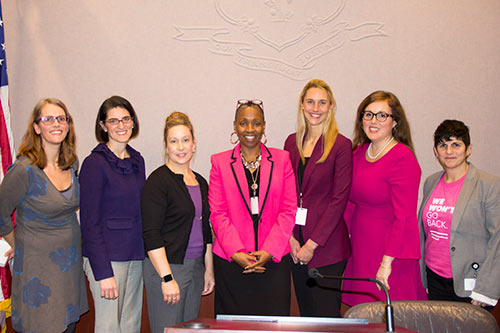Female Legislators Celebrate 45th Anniversary of Roe v. Wade and Announce Legislative Agenda

After a weekend of Women’s March events held around the United States, several of Connecticut’s female lawmakers and women’s health advocates came together today to celebrate the 45th Anniversary of the Roe v. Wade decision, one of critical landmarks in women’s health in United States History. In addition to remarking on this important decision protecting a women’s right to choose, the lawmakers announced their intention to introduce several bills establishing protections for women’s health in Connecticut. These bills will be designed to defend against the ongoing attempts at the federal level to roll back women’s access to necessary health services.
“Connecticut must stand up against attacks from Washington, DC on the healthcare women in our state rely on,” said Senator Mae Flexer. “I am proud today to stand alongside my female colleagues in honor of the strides made by the women who came before us. We will honor their work this year by continuing it through legislation that will protect and expand upon women’s access to basic healthcare for themselves and their children. In particular we must work to end the healthcare disparity that results in less access to care and higher rates of maternal mortality in urban neighborhoods and other underserved communities.”
“While the landmark Roe v. Wade decision legalized abortion across the United States, we need to do more to ensure women have control and power over their bodies and not the government. Statistics show that black teens are twice as likely as the national average to have abortions; and black women, regardless of their age, are four times more likely to have an abortion. As Republicans continue their efforts to dismantle Roe v. Wade, we need to ensure all women have the power to choose when and if they are going to get pregnant. This starts with improving black women’s access to health services, health providers and sex education, and protecting their right to affordable birth control,” said Representative Robyn Porter (D-New Haven).
“Every single woman should have the right to make her own medical decisions and choose what she wants to do with her body,” Representative Christine Conley (D-Groton) said. “The landmark Roe v. Wade Supreme Court decision was an important victory, but we still have a long way to go in ensuring all women receive comprehensive healthcare. This legislative session, I will continue to be an advocate for all women and fight for their reproductive rights, bodily integrity and privacy, along with their ability to obtain access to safe and legal abortions.”
“I am proud to join my colleagues today in standing up for health care rights for women across Connecticut. Women’s health care issues are family health care issues and they affect us all,” said Representative Caroline Simmons (D-Stamford).
“The bills we are introducing this session continue and strengthen Connecticut’s long commitment to protecting women’s reproductive rights and improving health care access for all,” Representative Cristin McCarthy Vahey (D-Fairfield) said. “From expanding women’s access to contraception and preventative services to preserving 10 essential health benefits established in the Affordable Care Act, these proposals will help women and their families lead healthier, more financially secure lives. We need to ensure that all women, regardless of income or skin color, have the ability to care for themselves and their children.”
“The current federal administration wants to send women back decades. The anniversary of Roe v. Wade serves as an important reminder that we can never allow that to happen—not in our state,” Representative Liz Linehan (D-Cheshire/Southington/Wallingford) said. “It’s not enough for women to be able to decide if they want to start a family; they must also be able to have children without risking financial ruin or fearing they’ll lose the basic services that keep them and their family healthy.”
“This year we celebrate an important landmark in the fight to secure women’s access to basic and necessary health and contraceptive services,” said Senator Terry Gerratana (D-New Britain). “I can think of no better way to celebrate that landmark than by building on it, and I am proud to support legislation this session that will protect women’s healthcare. These bills will enshrine the progress made by the Affordable Care Act into Connecticut law, ensuring women in our state do not have their access to care interrupted by changes made in Washington, DC.”
“On the anniversary of Roe we recognize the importance of every individual being able to make decisions about her own life, body, and future,” said Sarah Croucher, Executive Director of NARAL Pro-Choice Connecticut. “These freedoms require a range of supportive policies and we are pleased to join with legislators to protect current coverage for birth control, to continue to improve access to contraceptive and other healthcare services, and to protect Connecticut residents seeking real reproductive healthcare from the lies and misinformation of anti-choice crisis pregnancy centers. By working together, we can further expand reproductive freedom in our state.”
“For 45 years, Roe v. Wade has kept abortion safe and legal in the U.S.—but it hasn’t kept politicians from trying to make abortion harder to access, especially for young people, people of color and people with low incomes. At Planned Parenthood, we believe in the right of all people to make their own personal medical decisions about pregnancy, without political interference,” said Gretchen Raffa, Director of Public Policy, Advocacy & Strategic Engagement with Planned Parenthood of Southern New England. “Full equality depends on our freedom and opportunity to control our lives at the most basic level: our bodies, our families, and our life’s path. 2018 will be a pivotal year for reproductive health and rights, with women leading the fight for a world where all people have full equality, including access to safe and legal abortion.”
The legislators announced their intention to introduce and support the passage of several bills enshrining the women’s health aspects of the federal Affordable Care Act (ACA) into law. The passage of these bills will ensure that Connecticut women do not have their healthcare impacted by attempts in Washington DC to repeal the ACA.
10 Essential Benefits
The legislators will introduce a bill ensuring that health insurance plans offered in the state of Connecticut cover the “10 essential benefits” protected by the ACA. These benefits include outpatient care, as well as hospital care and trips to the emergency room, prenatal care and ongoing care for the baby throughout its childhood, prescription medicine, lab tests, as well as mental health and substance use disorder services.
Women’s Preventative Services
Legislation introduced this session will allow Connecticut to join a growing list of states that protect women’s access to contraception and other preventative health services with no out-of-pocket cost. More than 746,000 women in Connecticut have gained access to birth control with no out-of-pocket costs. There have been multiple attempts at the federal level to roll back this benefit. This change can cost a woman up to $600 a year, making it unaffordable for those who are already struggling to make ends meet. Increasing these healthcare costs would worsen the healthcare disparity between poor, underserved communities and other, wealthier parts of the state, contributing to a higher rate of maternal mortality and other health complications.
Building on the ACA’s Preventative Coverage
Legislation to be introduced this year will expand on the progress in reproductive health made by the ACA by expanding coverage for contraception. This new legislation will expand coverage for contraception to include 12-month prescription coverage and emergency contraception with no co-pay.
Shedding Light on “Crisis Pregnancy Centers”
Legislation will be introduced this year to ensure that people seeking healthcare advice about a pregnancy are not lied to or shamed by staff at “crisis pregnancy centers” seeking to further a political agenda. Crisis pregnancy centers are organizations that attempt to look like legitimate family planning clinics, while actually providing medically inaccurate, anti-choice information. They target urban neighborhoods and other medically underserved communities where people do not have access to a regular gynecologist.
Share this page:
